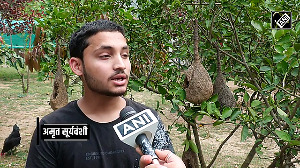The contentious issue of agricultural subsidy given by the United States and European countries is likely to dominate the forthcoming World Trade Organisation ministerial talks to be held at Cancun in Mexico.
Patrick F K Macrory, an internationally renowned WTO expert and director of Legal Studies at International Law Institute in Washington, told a seminar organised jointly by the Exim Bank of India and the Indian Institute of Social Welfare and Business Management in Kolkata, that the European countries were giving huge subsidies to their farmers, as a result of which agriculture in the developing nations was being affected.
| |||||||||||
Patrick said the US was also doing the same, but not to a great extent like the European nations.
The WTO expert said that the other controversial issue of export subsidy would also hog the limelight at Cancun talks. Like farm subsidy, the European nations were also doling out huge export subsidies, which were damaging the interests of developing countries, he added.
Market access issues raised by both the developed and developing nations would also be debated strongly in Cancun, he observed.
On the issue of sanitary and phyto-sanitary conditions imposed on the exports from developing countries by developed ones, Macrory said that an agreement in this regard is likely to be reached at Cancun, ensuring that these kinds of non-tariff barriers do not come in the way of global trade.
Besides these issues, the Cancun talks would also deliberate on the Singapore issues of investment standards, competition and transparency in government procurement and trade facilitation.
The WTO expert said that the European countries would like to see an agreement on investment standards, while the US has remained quite neutral on the contrary.
Competition, he said, would largely revolve on transparency and accordance of most favoured nation to the developed countries.
On the issue of market access of industrial goods, the Cancun meet is likely to be successful as an agreement may be reached, he said.
The environmental and labour issues, he said, would definitely take a back seat at the forthcoming ministerial talks.
Unlike the Doha round of negotiations, he hoped that the Cancun talks would be acceptable to all the concerned nations.






 © 2025
© 2025